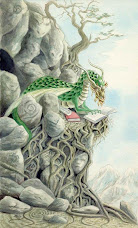Lesson 3: So, maybe you've set up your journal and made a bunch of notes based on your own feelings and intuition, maybe you haven't. If you haven't and don't intend to, that's okay. Learn your way, by all means. With or without your personal tarot book, it's time to crack the books!
I recommend two tarot books in particular, although these aren't by any means the best/only books to use.
Tarot for Beginners by P. Scott Hollander because I really like the way she works numerology into tarot reading. I found it helpful without being complicated at all. Especially since I don't know numerology. I also have her book on handwriting analysis and am slowly working my way through it. The author puts a lot of thought, energy, time, and experience into her writing.
Seventy-Eight Degrees of Wisdom by Rachel Pollack is the undisputed bible of tarot.
If you are looking for some good tarot resources, check out tarot books at Amazon and http://www.aeclectic.net/ and read the reviews carefully. I've been lead to many good books through the reviews at both sites. But you don't have to go buy any books. You can just use whatever books you can find that you can afford or borrow from the library. Also, your LWB will be helpful now. Every book on tarot is going to have a different view of tarot, take what works for you and keep your mind open to what may not work for you now but might work very well in the future.
You will find a wealth of information and opinion on tarot meanings online, you don't even have to own a tarot book to learn tarot with the world wide web at your fingertips.
It's important to keep in mind that every deck is different and so is every reader. There is no hard and fast rule to tarot design or to tarot card interpretation. What I recommend is that you, one card at a time, start looking through your books, your LWB(s), and surfing the net to find out some different views on the individual cards. Read through these resources and decide for yourself if they make sense to you. Take whatever descriptions, explanations, symbolism, and interpretations that make the most sense to you and add those to the tarot book you are creating for yourself, you can always add to or take from your book later. You can also apply your knowledge or books on astrology, symbolism, color, and numerology your tarot interpretations. You don't have to use these, but if those things have meaning for you and work for you, then go for it!Using a three ring binder as your tarot journal is helpful here, allowing you to take from or add to your interpretations easily. I created three different tarot books this way as well as an online blog. Here's what I discovered about studying tarot books and symbolism. It gives you a base for understanding that is vital, unless you are one of those who are naturally gifted with the tarot and find that you don't need help to understand what the Universe is trying to tell you through the cards. Me, I needed help. I committed keywords for individual cards and their numbers to memory. I studied the cards upright and reversed. I learned, memorized, read, and studied. And then one day it started to all come together. I had a basic understanding of the cards, of what they meant to me, and now I don't need all that stuff I learned anymore. But I needed it in the beginning. After awhile the cards will speak to you. Until that time, it is really good to have a frame of reference (a book, your book, the LWB). The other good thing about learning all of this stuff, and yes, it takes time, is that even when the day comes that the cards are speaking to you quite clearly--you'll find yourself stumped. And you'll be glad that somewhere in the back of your mind are the basics you learned about tarot. You'll have to call on that one day. It's the foundation of your tarot work and while in years to come you won't give it much thought, it will always be at the base of your work.
What Does Perfect Mean?
12 years ago












No comments:
Post a Comment